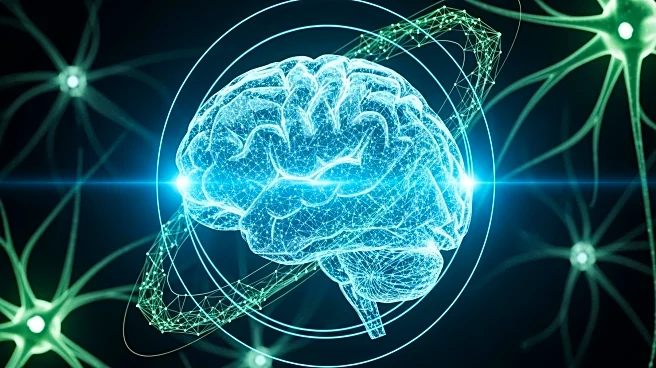What's Happening?
Delix Therapeutics, a clinical-stage neuroscience company, has announced the publication of a study in ACS Chemical Neuroscience detailing the effects of its novel compound, zalsupindole (DLX-001). This non-hallucinogenic neuroplastogen has shown promising
results in promoting neuroplasticity comparable to ketamine and psychedelics, without inducing hallucinations or dissociative effects. The compound targets serotonergic receptors, driving rapid structural and functional changes in the brain. Preclinical assays demonstrated increased dendritic spine density and enhanced functional plasticity, while pharmacokinetic studies revealed high brain penetration and rapid clearance. Zalsupindole's receptor profiling indicates a favorable safety profile, supporting its potential as a therapeutic for neuropsychiatric and neurodegenerative disorders.
Why It's Important?
The development of zalsupindole represents a significant advancement in the treatment of neuropsychiatric conditions. By offering the benefits of psychedelics without their hallucinogenic effects, Delix Therapeutics aims to provide a safer and more accessible treatment option for conditions like major depressive disorder. This could potentially transform the psychiatric treatment paradigm, offering rapid and sustained therapeutic effects. The compound's ability to promote neuroplasticity without adverse effects may lead to broader acceptance and use in clinical settings, addressing unmet needs in mental health treatment and improving patient outcomes.
What's Next?
Delix Therapeutics is currently completing a Phase 1b study of zalsupindole in patients with major depressive disorder. The company plans to advance its neuroplastogen platform, which has generated thousands of non-hallucinogenic compounds, through preclinical and clinical development. The goal is to bring FDA-approved, take-home medicines to market, enhancing the psychiatric treatment paradigm. Continued research and development may lead to new therapeutic options for a range of neuropsychiatric and neurological disorders, potentially expanding the use of neuroplastogens in clinical practice.
Beyond the Headlines
The introduction of non-hallucinogenic neuroplastogens like zalsupindole could shift the cultural and ethical landscape of psychiatric treatment. By providing effective alternatives to traditional psychedelics, these compounds may reduce stigma associated with psychedelic therapy and increase accessibility for patients. Additionally, the focus on neuroplasticity could lead to new insights into brain function and the treatment of synaptopathies, potentially influencing future research and therapeutic approaches.















